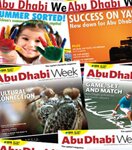As Arabic becomes an increasingly important language around the world, Abu Dhabi Week teams up with Berlitz to offer readers an unmissable opportunity to speak out – and have your say the ‘Berlitz way’!
Arabic is rapidly becoming one of the most important and influential languages in the world today.
From the world of international business to global politics, the Arabic language is a modern day ‘must’. But it’s equally important – and simply good manners – for anyone living in an Arab country such as the UAE to have a basic comprehension of everyday usage.
Few language teaching bodies around the globe can boast such a successful method or success rate in helping people to speak a foreign language than the internationally renowned Berlitz organisation. For more than a century, people from all around the world have looked to Berlitz for an effective, lasting, and enjoyable learning experience. With 130 years of experience, more than 470 centres in over 70 countries, and millions of satisfied graduates, Berlitz is regarded as one of the premier teaching methods for both personal and professional use.
Berlitz UAE was first established in the region in May 1998, with its first centre in Abu Dhabi. Since then, the group has expanded with centres in Dubai and Sharjah as well as Bahrain, Qatar, Oman and Beirut.
The Abu Dhabi centre proved to be an award-winning success, receiving several major international awards – and a expanding reputation. With an increasing population of expatriates flooding into Abu Dhabi and plans to boost tourism and business trade in the capital, the need to speak Arabic has never been greater.
“There is a growing demand amongst the public to learn Arabic these days,” explains Leila Shehab, Regional General Manager for Berlitz. “While it may never challenge English as an international language, its use is certainly widespread.”
Leila feels Arabic is becoming a significant language for business and politics. “Our region is a major centre for business and commerce throughout the world, and of course there are constant connections to Arabic in the world of international politics.
“We are finding that the demand for our courses is growing,” she adds. “People want to be able to converse and understand what is going on around them, and our methods seem to suit everyone.”
Berlitz can custom-design an effective language programme to meet an individual’s business needs, with a choice of private or semi-private classes for two or three students, group classes of four to seven, and larger groups of 8-12.
“It is our method that is so successful,” says Leila. “From the very beginning, we only speak in the language that people want to learn. They are taught to immediately think in the language and not spend time translating.
“But people can also learn at their own speed. We can offer ‘crash’ courses or longer extended periods to suit everyone.”
Now Abu Dhabi Week is combining with Berlitz to offer readers the opportunity to study Arabic through a series of collectable columns in a simple-to-understand format that offers essential phrases to be used in everyday situations
Meeting and greeting
Greetings used at any time English Reply
Assalam Aleikum Hello Aleikum Assalam
Marhaba Hi Marhaba
Ahlan Welcome Ahlan
Ma’ Salama Good bye Ma’ Salama
Sabah el Khayr Good morning Sabah el noor
Masa’ el Khayr good afternoon/good evening Masa’ el noor
Tesbah Ala Khayr Goodnight W inta bi Khayr
Shoo ismak (masculine singular) what’s your name Ismi [your name] (my name is …)
Shoo ismik (feminine singular) Ismi [your name] (my name is …)
Geography
Min wayn inta (where are you from?)
Ana min ... (I am from …)
Lubnan (Lebanon)
Souria (Syria)
Iraq (Iraq)
Filistin (Palestine)
Al Bahrayn (Bahrain)
Qatar (Qatar)
Uman (Oman)
Tunis (Tunisia)
Al Jazaer (Algeria)
Misr (Egypt)
As Saudiya (Saudi Arabia)
Al Yaman (Yemen)
Al Maghrib (Morocco)
Dawla Arabia (Arab country)
Asya (Asia)
Ustraliya (Australia)
Amrika (America)
Urubba (Europe)
Ifriqya (Africa)
Inglitera (England)
Faransa (France)
Hollanda (Holland)
Italya (Italy)
Ispania (Spain)
Finlanda (Finland)
Ana min faransa (I come from France)
Ana faransi (I’m French)
Ana min misr (I come from Egypt)
Ana misri (I’m Egyptian)
Arabic facts
- Arabic is spoken by more than 280 million people as a first language and by 250 million more as a second language.
- During the Middle Ages, Arabic was a major vehicle of culture in Europe, especially in science, mathematics and philosophy. As a result, many European languages have also borrowed numerous words from it.
- Arabic influence is seen in Mediterranean languages, particularly Spanish, Portuguese, Maltese, and Sicilian, due to both proximity and 700 years of Arab rule in the Iberian Peninsula.
- The Berlitz teaching method uses a standard form, but there are many different dialects of Arabic – not all of which are mutually intelligible. Modern Standard Arabic has evolved as a commonly understood form; it derives from Classical Arabic, which today is used primarily in literature and religion.
Special offer!
Have your say with Abu Dhabi Week and Berlitz in an amazing Springtime special offer!
Until the end of May each reader of Abu Dhabi Week to register for a Berlitz course will receive a special 10 percent Discount on production of a copy of the magazine.
For more details contact Berlitz on 02 448 6667 or email This e-mail address is being protected from spambots. You need JavaScript enabled to view it
[Originally published in Abu Dhabi Week vol 2 issue 14]





